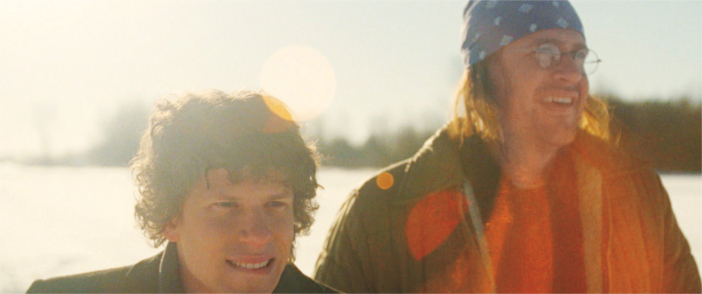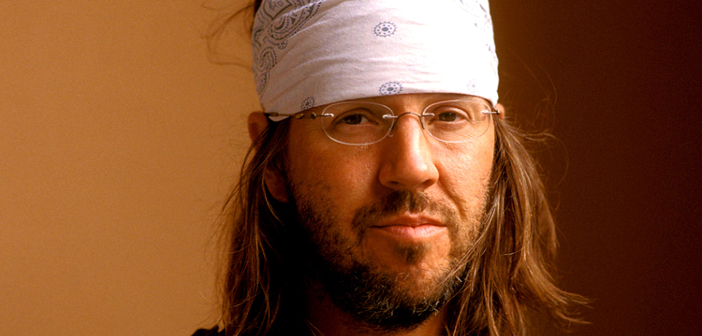Journalism on Film | 1 | Raw Humanity in The End of the Tour
Starting today, HeadStuff will be publishing a series of weekly articles on how the journalistic process is depicted on film – the intense research involved in the practice, the time it takes to articulate a story, and the false intimacies that come with the interview process. First up, Andrew Carroll writes about the raw humanity in James Ponsoldt’s The End of the Tour.
Interviews are some of the worst experiences we as people can go through. They require us to be totally ourselves and yet not ourselves at the same time. They consist of awkward silences, meandering explanations, and the kind of laughter that’s only normal in the company of complete strangers. And yet, despite all these cringe-worthy encounters, society would collapse without the interview process. No one would have a job, the Sunday paper would be half blank and some of the world’s greatest scandals would still be hidden away. Civilization depends on us sending out CVs, and it depends on journalists writing three thousand words on someone who didn’t want to talk to them. Weird, I know, but that’s the world we live in.
There are a significant number of films that involve interviews as a focal point. Frost/Nixon, Capote, and several others all involve larger than life figures conducting incredibly difficult interviews. That said, it’s hard to feel like you know these historically significant politicians, journalists, and writers because they were titans in their respective fields. A film like The End of the Tour is a film that is much like the moment in the Wizard of Oz where, instead of a giant green wizard head, you get an ordinary man. In interviewing writer David Foster Wallace (Jason Segel), David Lipsky (Jesse Eisenberg) finds the disappointing yet achingly human core of the interview process itself.
In interviewing writer David Foster Wallace (Jason Segel), David Lipsky (Jesse Eisenberg) finds the disappointing yet achingly human core of the interview process itself.
The End of the Tour opens in 2008 where David Lipsky receives news of acclaimed writer David Foster Wallace’s suicide. The rest of the film is then told through a flashback in 1996, to the last five days of Wallace’s book tour for his magnum opus Infinite Jest. Lipsky accompanies Wallace on this book tour in order to profile him for Rolling Stone. Unfortunately for Lipsky he finds himself liking Wallace far more than he thought he would, leaving him at a loss as to whether he should exploit Wallace’s good nature or write an average profile. Instead neither happens.

Lipsky’s interview with Wallace was never published. The recordings still exist on YouTube but Rolling Stone never ran the article due to a heroin epidemic in Seattle, where Lipsky was assigned immediately after meeting with Wallace. Instead we have the recordings and The End of the Tour based on Lipsky’s own book “Although of Course You End Up Becoming Yourself.” Lipsky’s book is essentially the article but without the filmic glamour. So, what happens when that cinematic filter is placed over an extraordinarily raw and human work? The short answer: nothing and everything.
Director James Ponsoldt puts a romantic sheen to Wallace’s idyllic mid-western homestead. It’s an eccentric writer’s paradise: two dogs in a cosy bungalow overlooking a vast snow-filled plain that stretches past the horizon. In the cities of Minneapolis and New York realism sets in. There are commercials everywhere, everyone looks like sardines in a can, and even great genius can be stifled. It is in the grounded vernacular of the script, the performances of the two leads, as well as the way the interview segments are shot, that The End of the Tour really shines.
Jesse Eisenberg and Jason Segel are two men that come across as awkward by nature. Their performances in indie comedies and dramas show characters bumbling around behind stilted facades always on the edge of slipping. So, it’s natural that these two men would portray two awkward writers. One who wants his big break and the other who wants something unattainable. As Lipsky himself said: “I wanted exactly what he had and he wanted so much more.” When I watched, or read interviews with Wallace, I was struck by the fact that a man who had won America’s only award for being a genius, the MacArthur Genius Grant, was so normal. He had been a football quarterback, a high school tennis star, a security guard, and a bus driver. He had also published massive novels of post-modernist meta-fiction and comically absurd journalism pieces. It is this everyman genius that Segel gets across so well while Eisenberg plunges deeper into everyman jealousy.
When I watched, or read interviews with Wallace, I was struck by the fact that a man who had won America’s only award for being a genius, the MacArthur Genius Grant, was so normal.
The End of the Tour is a film that anyone can watch. I’m not saying everyone will enjoy it but it is captivating in its ordinariness. David Foster Wallace and David Lipsky discuss everything from fast food to TV, depression to writing, and the decline of America to Wallace’s own addictions. It is in the latter discussions that the ugly side of the interview process is revealed. Interviewing someone in such a personal and intimate manner as Lipsky did with Wallace is bound to create tension. It is a nasty thing to do to someone; to just keep on pushing until an exposed nerve reveals itself. It is journalism at its most horrible and exploitative. Nonetheless it is also honest.

Like any good Hollywood film everything works out at the end. David and David put aside the ugliness of the tour’s last hours and become friends. Neither man has found what he started out looking for but has found something more meaningful. Both men went on to great personal and professional success. David Foster Wallace got married and published a great deal more. David Lipsky became a successful editor, author, and journalist. And then in the autumn of 2008 Wallace wrote a two-page note, said goodbye to his dogs and organised the manuscript for his last novel before hanging himself.
Interviews are horrible things but they are necessary. The End of the Tour is a humorous, humane, and tragic look at the interview process; how it can go right and very wrong. It is more than that though. It is a testament to the humanity of genius and the genius of humanity. David Lipsky’s own memorial The Lost Years and Last Days of David Foster Wallace gives us a taste as well. Wallace once wrote “I want to write books people will read for a hundred years.” We haven’t quite hit that bench mark yet but I think we’re on the right track.
[arve url=”https://www.youtube.com/watch?v=DBk1Mrb4RyM” mode=”normal” align=”center” autoplay=”no” maxwidth=”750"]

